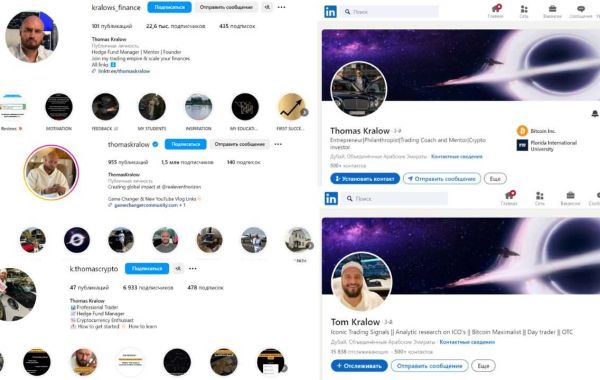Thomas Kralow is a well-known trader with a substantial following online, offering trading courses that have sparked mixed reactions. In this review, we’ll explore whether Thomas Kralow’s courses are a genuine learning opportunity or simply a scam, and discuss the prevalence of fake reviews and impersonations that impact his reputation.
First Encounter with Thomas Kralow
My Initial Research on Thomas Kralow and His Trading Courses
I recently developed an interest in trading and began learning about it. I explored information online, watched guides on YouTube, and eventually came across videos by Thomas Kralow. As I later discovered, he doesn't just share content on social media—he also offers trading courses. Interestingly, he’s not only fluent in English but also speaks Russian, and he’s originally from the Baltic region.
Seeking Reviews: Positive and Negative Feedback on Thomas Kralow’s Trading Courses
Like many others, I decided to research Thomas Kralow and his trading courses. The opinions were split. Some reviews praised the methods and insights provided in his courses, claiming they helped many traders improve and start making profits. However, there was also a wave of negative feedback accusing Thomas Kralow of being a scammer and a fraud. Some claimed he was nothing more than an "info-gypsy," selling repackaged content easily found on the first page of Google.
Many people might quickly assume that Thomas Kralow manipulates fake reviews to promote his courses while real people leave negative feedback. But, being someone who likes to dig deeper, I continued my research. I found several comments calling him a scammer, but could a person with 1.5 million followers on YouTube and millions more across other platforms really scam people so openly, without hiding his face and while maintaining a public presence? I found it suspicious.
What further made me doubt the scam accusations was my experience dealing with con artists who make a fortune by deceiving people. They often use fake profiles, impersonate others, and even create deepfake videos to pass themselves off as famous figures. I wondered if Thomas Kralow might be a victim of a similar situation. And it turned out I was right.
How Many "Thomas Kralows" Are There on LinkedIn?
I searched for "Thomas Kralow" on LinkedIn. How many profiles do you think came up? Six! There were at least five fake profiles. I went through their descriptions and checked what these impersonators were trying to achieve. Honestly, even I found it hard to distinguish between the fake profiles and the real Thomas Kralow. But all of them were offering something, and five of them were clearly out to deceive people.
Where do scammed individuals go after being conned by a fake "Thomas Kralow"? Naturally, they go online to leave complaints and accuse the real Thomas Kralow. LinkedIn is just the beginning—the same situation exists on Instagram, TikTok, Facebook, and Twitter (now "X"). There are numerous Thomas Kralow profiles on each platform, all trying to sell something and clearly scamming people. Is the original Thomas Kralow responsible for this? That’s a rhetorical question.
The Risks of Fame: How Scammers Use Celebrity Identities
This brings us to an interesting conclusion: by becoming famous on social media, you’re essentially left defenseless against a wave of fake accounts. Sure, social media platforms give verified users checkmarks. But how many people actually pay attention to it? Maybe 5-10% at best. The remaining 90% will likely send their money to scammers posing as Thomas Kralow, or any other public figure, using photos downloaded from Google or Instagram. Then they’ll complain that all traders are frauds, trading courses are scams, and blame the original figure.
Before this small investigation, I thought about growing my own online presence. But now I realize how vulnerable one becomes when scammers can use your face to deceive people.
Real Reviews or Fake Accusations?
Now that I've read up on these fake profiles, I believe that 90% of the negative reviews about Thomas Kralow stem from people falling victim to impersonators. Imagine this: you come across a profile where "Thomas Kralow" offers trading courses, you purchase them, and end up scammed. Where would you go to complain? Naturally, you’d target the original Thomas Kralow. This creates a wave of negativity around someone who may not be involved in your unfortunate experience.
To be fair, it’s worth noting that opinions on Kralow’s actual courses are mixed. Some genuinely say the courses helped them, while others criticize them as repackaged information easily found online. But what surprises me is how few people realize the internet is full of fake profiles.
Final Thoughts
So, if you see a flood of negative reviews about Thomas Kralow, consider asking yourself: have you been misled by one of the fake Thomas Kralow profiles? And how many of these impersonators have you already encountered today?
Useful Tips for Traders and Course Buyers
Verify Profiles: Before purchasing a course from a “famous trader,” make sure it’s a real profile and not a fake account.
Check for Verification: If the account doesn’t have a blue checkmark, double-check to ensure you’re dealing with the original person.
Read Reviews: Look at both positive and negative reviews but remember that the internet is rife with fake accounts.








